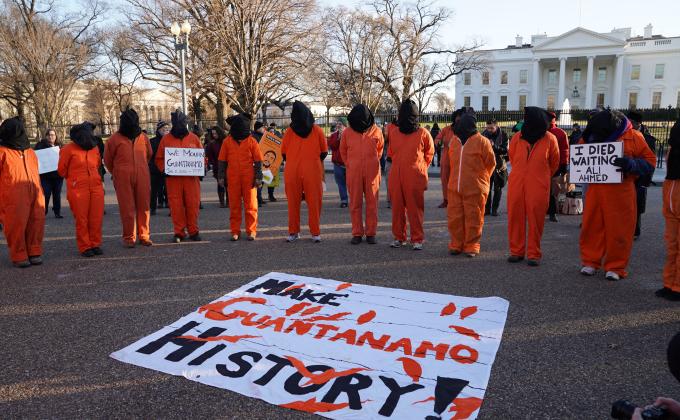Date: Monday 3 December 2012, 18:00 - 20:00.
Venue: Campus The Hague – Location Stichthage
On Monday 3 December, ICCT convened a debate with Col. (U.S. Army, retired) Fred Borch and Prof. Dr. Geert-Jan Knoops on the use of military tribunals for prosecuting alleged terrorists. Fred Borch is currently a Visiting Professor and Fulbright Scholar at Leiden University. Previously, he was the first Chief Prosecutor for the military tribunals at Guantanamo Bay. Prof. Dr. Geert-Jan Knoops is Professor of International Criminal Law at the University of Utrecht and practices as a lawyer at Knoops’ Advocaten in Amsterdam. The debate was moderated by ICCT Research Fellow Mr. Claudio Matera.
Col. Fred Borch started the debate arguing that military commissions are not only lawful, but are also a logical and appropriate option for trying terrorists and indeed for prosecuting any violation of the Laws of War. As the war between al-Qaeda and the government of the United States constitutes a non-international armed conflict between a non-state actor and a state, common article 3 of the Geneva Conventions provides for the lawful use of military tribunals. Under American law, Borch argued, the establishment of the Guantanamo trials is also rooted in legality. Although the U.S. Supreme Court in Hamdan vs Rumsfeld found that the Guantanamo trials created by President George W. Bush were not in accordance with the law, the subsequent authorisation by the U.S. congress in 2006 provided the legal basis for trying alleged terrorists who were captured on the battlefield in Afghanistan in a military setting.
Col. Borch also highlighted the practical advantages of utilizing military tribunals over civilian courts. These relate, among others, to the flexibility of military tribunals with regards to a) the difficult reality of preserving evidence in combat zones, and b) physical location, which allows for the prosecution of suspects outside the U.S. and potentially closer to the suspect’s place of capture. Col. Borch highlighted particularly the difficulty of safeguarding evidence in conflict situations through his personal experience as former Chief prosecutor in Guantanamo Bay.
While Prof. Dr. Geert-Jan Knoops did not challenge the legality of military tribunals for prosecuting alleged terrorists, he challenged the fairness of these judicial proceedings. He gave a comprehensive overview of the case law relevant to the use of military tribunals and particularly the interplay between military tribunals and U.S. civilian courts at various levels. Differences in decisions between local and federal judges in American civilian courts, as well as the conflicting opinions between military and civilian benches, has highlighted the complicated nature of the legality of both substantive and procedural aspects of trying terrorist suspects in military settings.
According to Prof. dr. Knoops, issues of particular concern for human rights standards and fairness include the availability of evidence, the use of in camera proceedings, the expediency of trials, conspiracy charges and material support for terrorism as a breach of the international laws of war, methods of interrogation, disclosure obligations and equality of arms between the defendant and the prosecution. Particularly the jurisprudence by the European Court of Human Rights and other cases in Europe seem to highlight the difficulties connected with fairness in military tribunals.
During the Question-and-Answer session, Prof. Dr. Knoops agreed that there may be a potential paradigm shift from trying terrorists in military settings to extrajudicial killings through the use of un-manned aerial vehicles (drones). He did, however, outline the possibilities for family members of a deadly drone attack to seek judicial remedy in civilian courts. Col. Borch described the legal obstacles for closing Guantanamo Bay given the position of the U.S. Congress in opposing domestic trials of Guantanamo detainees, and considering the lack of cooperation by other states in conducting such trials. He emphasized that America’s system for prosecuting non-domestic terrorist suspects in military tribunals is still in its early stages with many lessons to be learnt. The speakers differed on a possible model for dealing with legal predicaments in the future. While Prof. Dr. Knoops suggested a separate legal structure within the U.S. federal law system specialized to deal with terrorist suspects (similar to one which currently exists in France), Col. Borch was hesitant to endorse setting up yet another parallel legal structure.
The evening highlighted the complex nature of prosecuting terrorists suspects with discussions exploring the institutional, practical, historic and jurisprudential difficulties of such endeavors. Importantly, both speakers agreed on several points and one of Col. Borch’s statements resonated with broad sections of the audience: “The only trial that is important is the one in the court of public opinion.”



